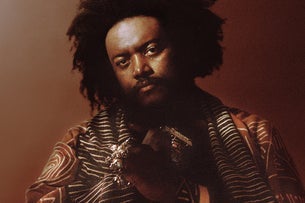'I Didn't Want To Go Half & Half - I Wanted To Go All The Way'
"In the past people's perception of what jazz is was skewed so we would play and people would literally come up and say, 'What kind of music do you call that?'"

After finishing high school, Kamasi Washington - the composer and tenor saxophonist frequently referred to as the future of jazz, and possibly the most widely celebrated jazz musician of the past decade - strongly considered becoming a physicist.
"I was on the fence about whether I would study music or physics," he says. Then it occurred to him: why not do both? "When you're young, your perception of time is skewed," Washington says, "so I thought I could be a physicist and a musician."
While at college, Washington quickly learned that trying to occupy both worlds meant he couldn't fully commit to either. "If you split your day in half," he says, "you'll never do as much as you could do in either [half]. I didn't want to go half and half. I wanted to go all the way. And you can't go all the way in both ways."
But Washington has certainly gone all the way with his music, collaborating with the likes of Kendrick Lamar, Flying Lotus and Thundercat in the process, as well as amassing widespread critical acclaim for his own music, including 2015's aptly titled triple-album The Epic and last year's excellent Harmony Of Difference EP.
Don't miss a beat with our FREE daily newsletter
Washington is often saddled with grand descriptors like "genius" and "saviour", but says he's just glad that more people are now listening to jazz. "It feels like a lot of the misconceptions that were applied to it are fading away: like it being boring or for old people - things that were never true," he says. "But I would hear that a lot. I don't hear it anymore; I think it's a combination of musicians and the audience coming together."
Washington is one of the main figures responsible for bringing jazz to new audiences, including mainstream, youth-focused festivals like Coachella and Bonnaroo. And he says that talking about and playing jazz for different types of people has been the focus of his life since before anyone was really listening. As a teenager, Washington and his friends would play on any stage in Los Angeles that would have them.
"Me and my whole crew are used to taking our music places where people would say it couldn't go," Washington recalls. "We'd play straight-up DJ clubs where the stage is tiny and we've got an eight-piece jazz band. So they're expecting to hear DJs all night, and they will be into it and not even realise they're listening to jazz. In the past, people's perception of what jazz is was skewed so we would play and people would literally come up and say, "What kind of music do you call that?" So now we're still doing the same thing, but we're doing it globally. It's definitely humbling and it feels good to have people accept this music that I feel, like, is so beautiful."
Jazz couldn't ask for a more passionate spokesperson to espouse the joys of this beloved genre. "It's such a gift to the world," Washington says. "Not just the aesthetic of jazz, but the idea of it being music that celebrates self-expression and the moment; being present in the time that you're in and connecting with people. It's not about the individual, it's about expressing yourself with someone else and sharing. That's what jazz is all about. So to be able to spread that message is something I feel, like, is really important. Sometimes we can feel pretty disconnected, but jazz, in its purest and most beautiful form, really brings people together."
Washington has done more than just about anybody else in recent years to bring people together through jazz, having transcended the somewhat-insular world of jazz to be embraced by wider audiences. So what does he want next?
"I just want to play beautiful music," Washington says. "I always say music comes to us, or through us, more so than from us. So I'm always just searching for the gems, little seeds that I can grow and develop to their fruition. It's kind of a journey where I don't know what it's going to lead to next. I'm kind of in a place right now where I'm just enjoying the freedom to be creative and let my creativity have a space to exist."








